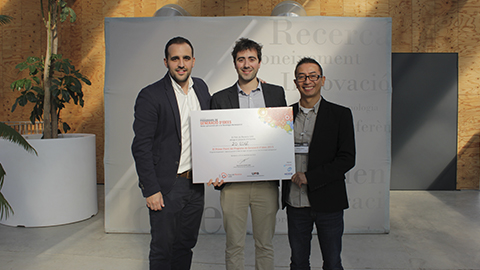Continuous production platform for graphene wins the Generating Ideas competition
2D EDGE, a groundbreaking system for synthesising high-quality graphene, is the winning project in the fourth edition of the Generating Ideas Programme. The second prize goes to the project OISensing and third prize to Smart Coding Tech.

First prize goes to the project 2D EDGE, led by Damià Viana, of the Catalan Nanosciences and Nanotechnology Institute (ICN2), Sergi Claramunt and Ferney Chaves, of the Department of Electronic Engineering, UAB and Àxel Sanz, a graduate in Business Management and Administration from the UAB. This project has developed a continuous production platform for high-quality graphene.
Graphene is a two-dimensional glass formed by carbon atoms, with high thermal and electrical conductivity and a combination of great flexibility and lightness and extreme hardness. These properties make it a possible alternative to several conventional materials in many applications. However, the lack of a large-scale, continuous graphene synthesis process has prevented it from being used in the industrial manufacture of devices and products in various sectors. Now, 2D EDGE proposes a groundbreaking graphene-synthesis mechanism that allows continuous production of graphene using the technique of Chemical Vapour Deposition (CVD).
This ability to produce graphene sheets continuously can optimise production costs and facilitate the use of graphene in a wide range of technological applications, in electronics, photovoltaic energy and the aerospace industry.
The prize is 2,500 Euros in cash and six months' incubation in the Eureka Building of the UAB Research Park, to further develop the idea and turn it into a business opportunity.
New material for detecting distant objects
The project OISensing takes the second prize: 1500 Euros and three months' incubation in the Eureka Building. This project has developed a new material named BL (Bi-Layer) Film, which is completely organic and sensitive to infra-red radiation. The characteristics of this material make it ideal for making sensors to detect distant objects at a lower cost, with lower energy consumption and no need for cooling. The project is led by researchers Victor Lebedev and Jaume Veciana of the Institute of Materials Science of Barcelona (ICMAB-CSIC), Dr Anna Magraso, of the the Catalan Nanosciences and Nanotechnology Institute (ICN2) and Fredi Fernandez, a specialist in sales and marketing.
The sensors they have developed together with BL Films are of particular interest to sectors like surveillance, security and instrumentation. More specifically, they will be used in drones to work in risk prevention, rescue and fire prevention. These sensors are more sensitive, cost 70 times less than the materials being used now and need less complex electronics, which means optimising their energy consumption. They also have environmental and security advantages for manufacturers as the material is of organic origin and contains none of the toxic elements that are necessary in present-day detectors.
Data Coding and Transmission Technology
Third prize, 1,000 Euros, goes to researchers Joan Serra-Sagristà, Ian Blanes and Sara Álvarez-Cortés, of the UAB's Interactive Image Coding group (GICI). Their project, named Smart Coding Tech, offers an innovative solution for rapid data transmission and efficient storage. It is a smart coding technology for advanced space-to-land communications, which allows very high transmission speeds when downloading satellite data and increases the amount of data sent.
The three projects were selected by a jury of experts in the valorisation of business ideas made up of Antoni Castro, Head of R&D at Sener, Núria Gil, Catalonia Delegate for Air Liquide, Jordi Isern, Director of the Institute of Space Studies of Catalonia (IEEC-CSIC), Jordi Arias, Project Manager for tech and aerospace startups at ACCIÓ, and Sergio Pérez, Director of ICT investments at la Caixa Capital Risc.
Related news
Generating Ideas Programme: five finalists chosen
UAB Research Park spearheads innovation in aerospace sector